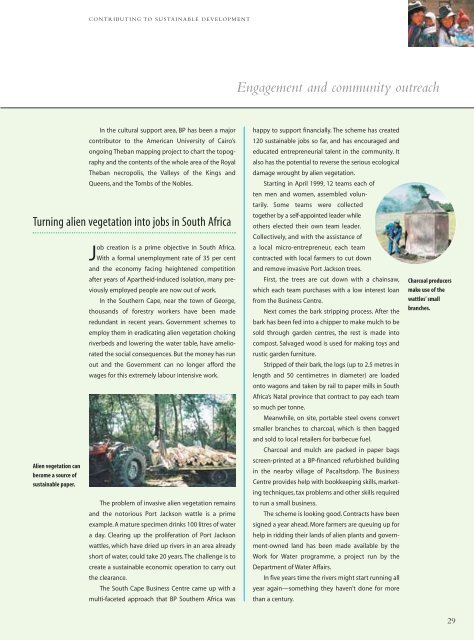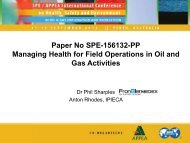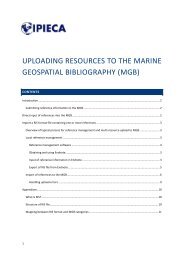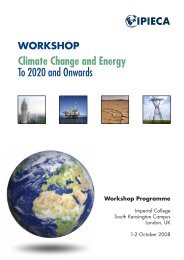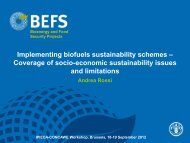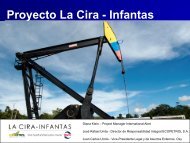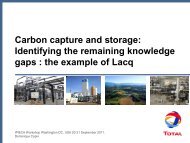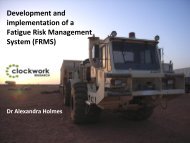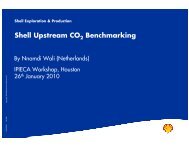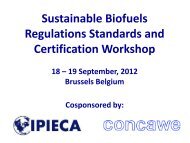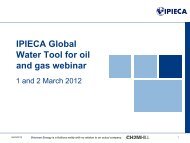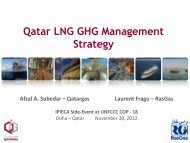WSSD Report FINAL! - OGP
WSSD Report FINAL! - OGP
WSSD Report FINAL! - OGP
You also want an ePaper? Increase the reach of your titles
YUMPU automatically turns print PDFs into web optimized ePapers that Google loves.
CONTRIBUTING TO SUSTAINABLE DEVELOPMENT<br />
Engagement and community outreach<br />
In the cultural support area, BP has been a major<br />
contributor to the American University of Cairo’s<br />
ongoing Theban mapping project to chart the topography<br />
and the contents of the whole area of the Royal<br />
Theban necropolis, the Valleys of the Kings and<br />
Queens, and the Tombs of the Nobles.<br />
Turning alien vegetation into jobs in South Africa<br />
Alien vegetation can<br />
become a source of<br />
sustainable paper.<br />
Job creation is a prime objective in South Africa.<br />
With a formal unemployment rate of 35 per cent<br />
and the economy facing heightened competition<br />
after years of Apartheid-induced isolation, many previously<br />
employed people are now out of work.<br />
In the Southern Cape, near the town of George,<br />
thousands of forestry workers have been made<br />
redundant in recent years. Government schemes to<br />
employ them in eradicating alien vegetation choking<br />
riverbeds and lowering the water table, have ameliorated<br />
the social consequences. But the money has run<br />
out and the Government can no longer afford the<br />
wages for this extremely labour intensive work.<br />
The problem of invasive alien vegetation remains<br />
and the notorious Port Jackson wattle is a prime<br />
example. A mature specimen drinks 100 litres of water<br />
a day. Clearing up the proliferation of Port Jackson<br />
wattles, which have dried up rivers in an area already<br />
short of water, could take 20 years. The challenge is to<br />
create a sustainable economic operation to carry out<br />
the clearance.<br />
The South Cape Business Centre came up with a<br />
multi-faceted approach that BP Southern Africa was<br />
happy to support financially. The scheme has created<br />
120 sustainable jobs so far, and has encouraged and<br />
educated entrepreneurial talent in the community. It<br />
also has the potential to reverse the serious ecological<br />
damage wrought by alien vegetation.<br />
Starting in April 1999, 12 teams each of<br />
ten men and women, assembled voluntarily.<br />
Some teams were collected<br />
together by a self-appointed leader while<br />
others elected their own team leader.<br />
Collectively, and with the assistance of<br />
a local micro-entrepreneur, each team<br />
contracted with local farmers to cut down<br />
and remove invasive Port Jackson trees.<br />
First, the trees are cut down with a chainsaw,<br />
which each team purchases with a low interest loan<br />
from the Business Centre.<br />
Next comes the bark stripping process. After the<br />
bark has been fed into a chipper to make mulch to be<br />
sold through garden centres, the rest is made into<br />
compost. Salvaged wood is used for making toys and<br />
rustic garden furniture.<br />
Stripped of their bark, the logs (up to 2.5 metres in<br />
length and 50 centimetres in diameter) are loaded<br />
onto wagons and taken by rail to paper mills in South<br />
Africa’s Natal province that contract to pay each team<br />
so much per tonne.<br />
Meanwhile, on site, portable steel ovens convert<br />
smaller branches to charcoal, which is then bagged<br />
and sold to local retailers for barbecue fuel.<br />
Charcoal and mulch are packed in paper bags<br />
screen-printed at a BP-financed refurbished building<br />
in the nearby village of Pacaltsdorp. The Business<br />
Centre provides help with bookkeeping skills, marketing<br />
techniques, tax problems and other skills required<br />
to run a small business.<br />
The scheme is looking good. Contracts have been<br />
signed a year ahead. More farmers are queuing up for<br />
help in ridding their lands of alien plants and government-owned<br />
land has been made available by the<br />
Work for Water programme, a project run by the<br />
Department of Water Affairs.<br />
In five years time the rivers might start running all<br />
year again—something they haven’t done for more<br />
than a century.<br />
Charcoal producers<br />
make use of the<br />
wattles’ small<br />
branches.<br />
29


